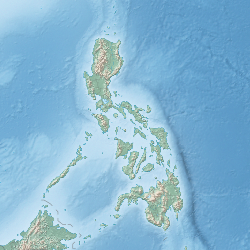| Bolusao Watershed Forest Reserve | |
|---|---|
| Bolusao Watershed | |
 Clockwise, from left to right: Amandaraga Falls, Pangi Falls, Amanjuray Falls, Upland Bolusao Tourism Road, Ban-awan Falls | |
| Location | Barangay Bolusao, Lawaan, Eastern Samar and nearby towns |
| Nearest city | Tacloban |
| Coordinates | 11°16′N125°20′E / 11.267°N 125.333°E |
| Area | 4,055 hectares (10,020 acres) |
| Established | December 1992 |
| Visitors | Negligible |
| Governing body | Department of Environment and Natural Resources |
Bolusao Watershed Forest Reserve is a reserve and ecotourism site in Barangay Bolusao, Lawaan, Eastern Samar, Philippines. [1] [2] Designated mainly to preserve and maintain the usefulness of the Bolusao River as a source of water for domestic use and irrigation in the area, it is now being revitalized as a sustainable energy source through Amanjuray falls' energy-generating Bolusao mini-hydro power plant, providing power to the residents of Lawaan and Balangiga in Eastern Samar. [3] [4] [5]






